So most of us have at least looked at our Moodle since the upgrade this August. Most of the changes are in the appearance and layout of the site. Moodle has become a bit more ‘streamlined’ in its appearance and there have been changes in where different functions are located. In an effort to help us all make the transition to the new Moodle environment, I wanted to give the campus a list of a few things that can help you navigate around a bit easier.
How do I switch my role to student so that I can view my Moodle page as a student would?
It can be very helpful to see and/or demonstrate what a course Moodle page looks like from the student’s viewpoint. To do this the instructor will need to click on their name at the top right-hand side of the Moodle page and then select “switch role to” from the dropdown menu that appears.
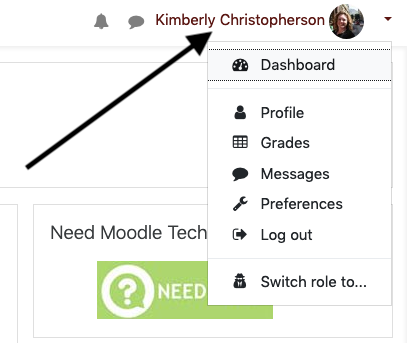
How do I add blocks (like QuickMail) to my Moodle Course?
Moodle offers a number of different types of ‘blocks’ where different types of information or function can be added to courses. To find how to add these, you will need to first ensure that you have Turned Editing On (click the gear at top right hand of a Moodle course), and then you will find the “add block” function at the bottom of the left hand navigation of the site.
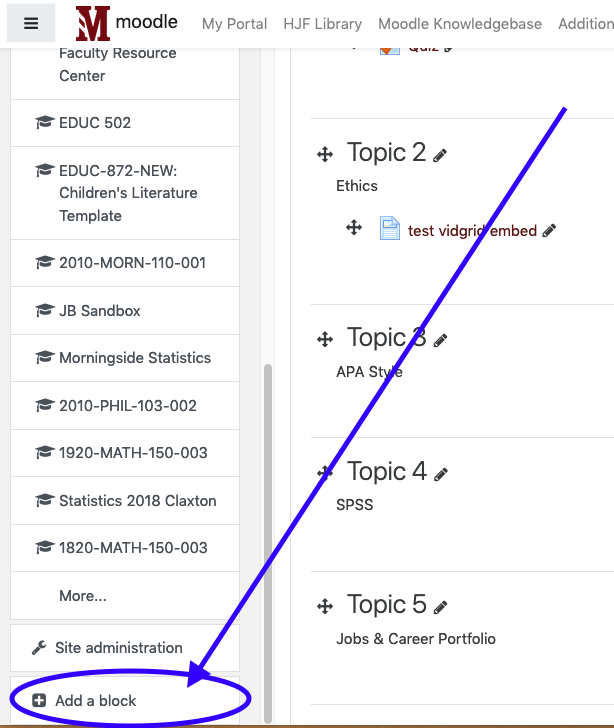
In addition to this menu function moving, there is another new feature to Moodle in that the screen is now responsive for the size of the screen the page is being viewed on. What this means is that if you keep your browser window small on your screen, the blocks may show up on the bottom of the course rather than on the right-hand side of the course. On a computer simply making your browser screen larger should make it so that the blocks will show on the right-hand side of the screen. On mobile devices, the blocks may only normally be visible at the bottom of the course. So if you or your students have a difficult time finding blocks, this may be the reason why.
Changes in Forums
One major change made in the forums to help with appearance and usability is that when posting to forums users are no longer necessarily directed to a ‘new page.’ However with this change it looks like some functionality has gone away (like posting immediately without delay or the ability to add attachments). These functions are still here (along with a new option for instructors to reply privately) but to access these the “advanced” link needs to be clicked.
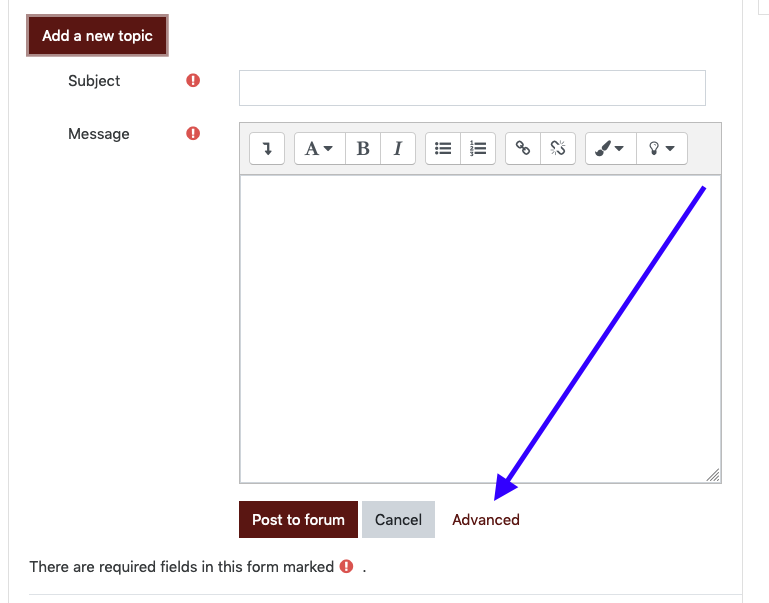
Once selected then a new screen appears with many of the functions instructors used in the old Moodle including choosing whether that discussion post is subscribed to, sending posts immediately without delay, and adding attachments.
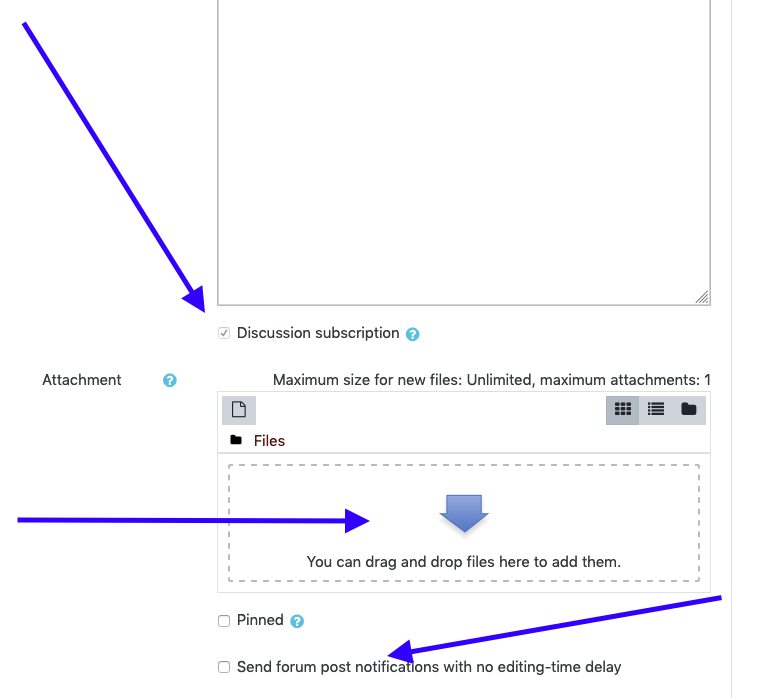
Another Forum tip in case folks want this, instructors can choose to make it default that they do not receive e-mails (notifications) of new discussion posts for their account (across all courses in Moodle). To do this, click your name in the top right hand corner and select preferences.
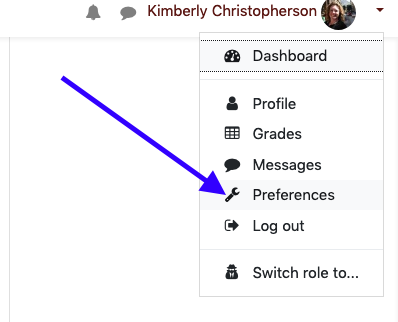
From here select Notification Preferences, scroll down to Forum and turn off the notifications here. This only affects YOUR account, not the students’ accounts.
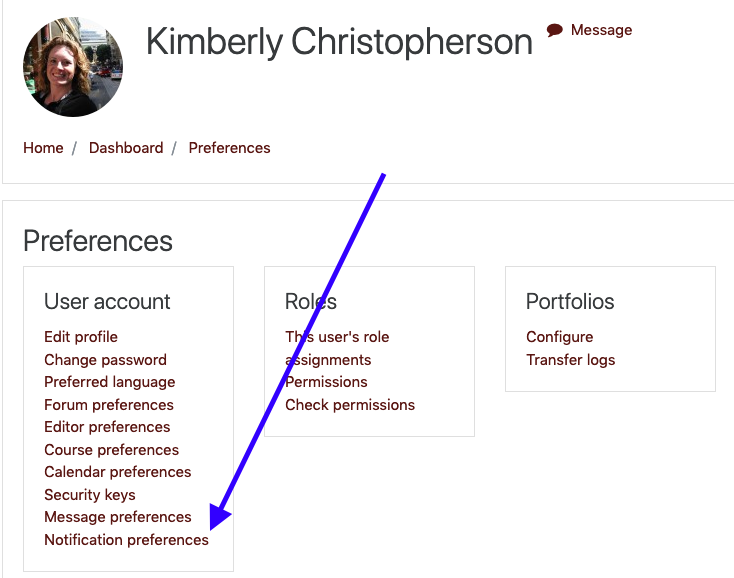

Changes in Manual Grading for Quizzes
Many people use Moodle to give exams and quizzes in their courses. If there are items that are text-based (essays, short answers) there is a way to see all student responses on the same screen to make manual grading less click intensive. To get to this function has changed a bit. First, click on the quiz that you plan to grade and then click the gear on this page. DO NOT CLICK THE ATTEMPTS! You cannot access the Manual Grading feature from here.
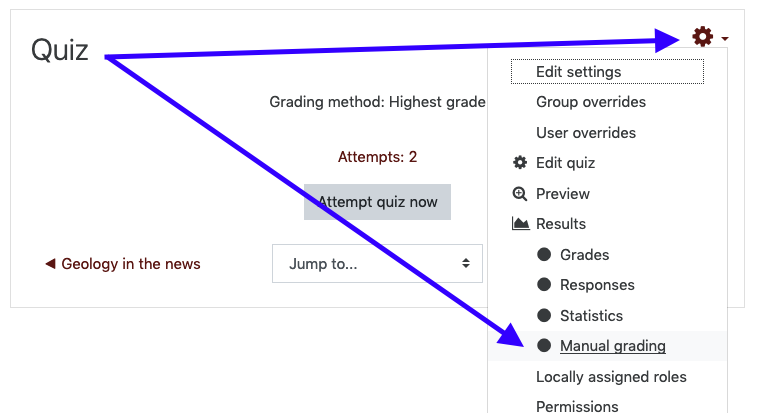
Related to the Quiz activity, where you go to import question banks has moved as well. This change will be discussed soon.
Changes in Assignments
There have been a few changes in the Assignments activity, but the one that I want to focus on for this post is to highlight a change to how files are downloaded if an instructor uses the “Download All” function. The Download All function is very handy because it can same time, can automatically name files with the student’s name, and make conducting a bulk upload of feedback files possible (must have the file named in a special way).
When you do into view submissions, at the bottom of your student list you will see an Options section with three boxes checked. If you leave the “Download submissions in folders” checked then every single student submission will be in its own folder and the file will be whatever the student named it.
If you want to download all of the submissions in the old way (all into one zipped folder with files automatically renamed with names and the ability to use these files to do a bulk upload) then you will need to uncheck this box.
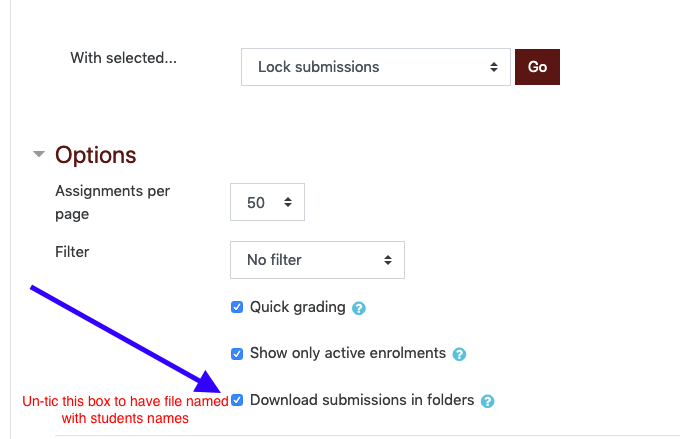
Unfortunately, at this time, there is not an administrative option to make this box a default ‘no’ so it is up to individual instructors to uncheck this box if you want to use the Download All function like in the previous version of Moodle.
Changes in Accessing other Administrative Functions
With the old Administration block removed, much of the functions that were present in that block are now in the gear on the top right hand side of a Moodle course. Functions such as accessing the Gradebook Setup, Backup/restore, and Import are clearly visible.
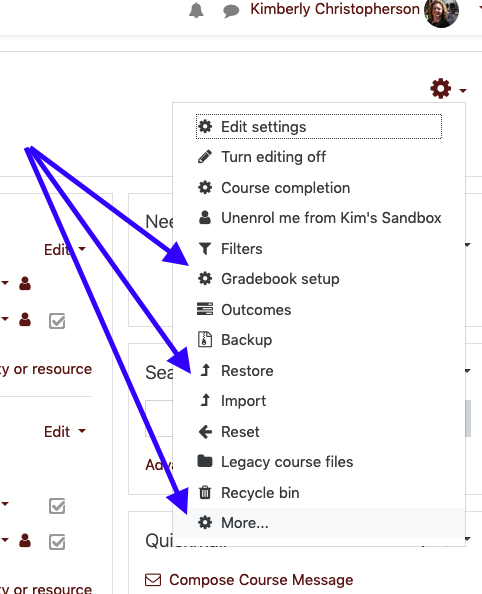
Hidden within the “More” link are other functions such as: Reports, Importing Question Banks, Creating Groups, and Adding Enrollment Methods (course meta-links).
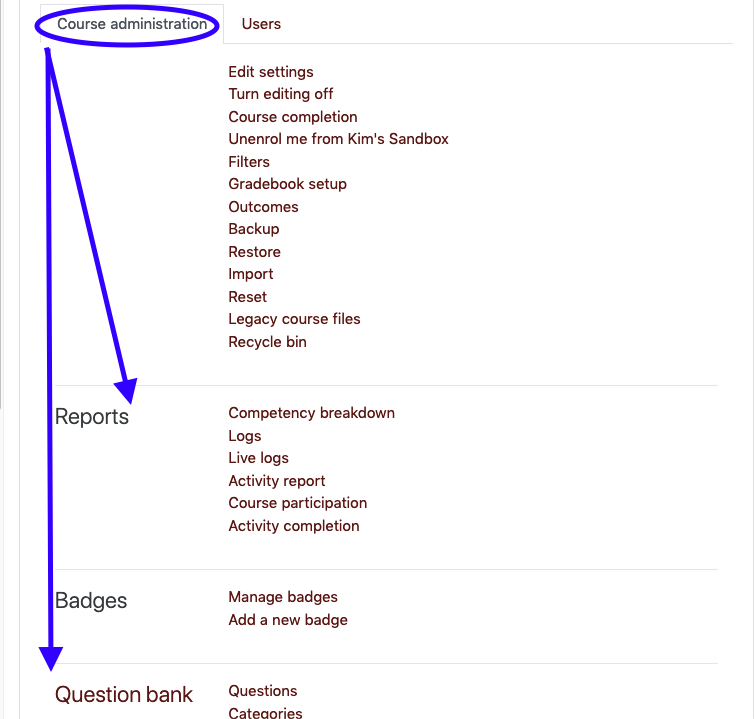
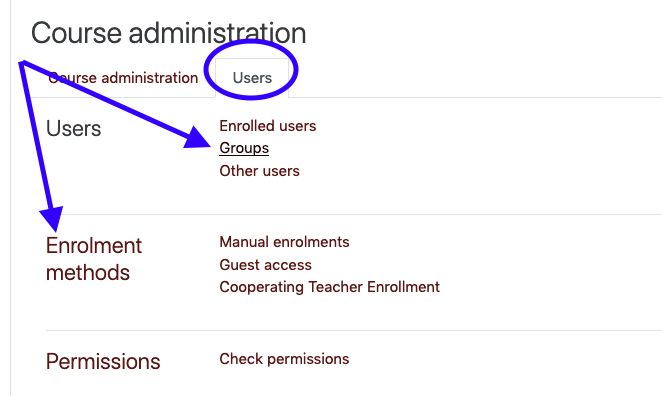
Hopefully this post can serve as a quick reference as we are all getting familiar with the new Moodle organization. These tips were selected because these are ones that were asked of me the past several days. This is by no means an exhaustive list of all of the changes. As this semester goes on, I hope to give several other posts about new features and changes to help our campus community adjust to the new Moodle interface. As always if you have questions or want me to help walk you through anything contact me for assistance.
World’s worst blogger?
January 7, 2013
I have a trend, I tend to post a few blogs early each semester and then stop. Not enough time. Nothing interesting to write about. etc etc etc.
I’ve also said it before that I would do better to write a bit m ore often. Once again I’ll make this ‘resolution.’ Maybe this time I’ll actually follow through.
For now, I’ll just share what I am looking forward to this spring semester. I am looking forward to what looks like an excellent student make-up in my experimental psychology course. I’m changing up some of the ways that I relay material (less direct instruction, more ‘constructivist’ methods) and I am hopeful that this will make the course more engaging for the students. Strangely, each spring I look forward to teaching stat. It’s a class not loved by most students, but I do get to have a lot of student contact with the activities and worksheets. I’m looking forward to finalizing my sub-committee’s section of our HLC self-study. This is a task that though extremely important, I would love to have off my plate! I’m looking forward to ‘hopefully’ having a good solid draft of a new curriculum by the end of this semester. It’s been a bit of a slog this year, this semester we MUST make some decisions and get this concrete. I REALLY look forward to when the revision of the curriculum is over! Again, important work – don’t get me wrong – but it is mentally and emotionally taxing because of the political nature of curriculum reform.
Perhaps more importantly though I look forward to working with my research students on their senior thesis projects. This is one of the great joys of my job and I love the point when the student gets to the end of the process, presents his or her research to others, and I can see that they can see the great accomplishment that they have made. I am hopeful that many will chose to present at a regional conference this year.
So what am I not looking forward to…well the usual: grading homework, giving detailed feedback on writing, long hours,early mornings, meetings, college politics, problem-child students. In my mind this is actually what they pay me to do…..the rest I would do for free if I were independently wealthy.
I guess one last thing to look forward to. For the new semester I get a new haircut and color. I also plan sometime to add a bit to my wardrobe with the gift cards I received for Christmas. Pretty things are always something to look forward to sharing!
Could it be true?
September 20, 2012
So I am starting my 6th year of service at Morningside College – the year the tenure is traditionally granted. The tenure portfolio is in and I’ve been told not to worry. I’ve been an active member on campus, was voted onto a curriculum committee that is currently doing curriculum revision, chairing a sub-committee for our upcoming HLC accreditation visit, have started a new and exciting research program at a local drug and alcohol treatment center, and the recipient of one of the prestigious teaching awards on campus. I guess I do not have much to worry about. But what is beginning to dawn on me and feels quite unnerving is the fact that I will soon be moving out of the category of ‘Junior Faculty Member.’
It is not an uncommon experience to not feel at advanced (in work, age, or what have you) as you actually are. I still feel a part of the junior faculty here, though I may soon not be seen as one by the ‘real’ junior faculty. I still have my moments where I feel I do not know the institutional history or traditions. I still feel that I am working hard to better myself as a mentor, instructor, and scholar. However, I also still feel that sense of being an imposter where though I have been given some heavy responsibilities, that I will not live up to them. A tenured faculty member doesn’t feel like this, right?
Perhaps what is making this acutely present for me is the fact that we have two new faculty members in our department this year. I feel that I want to be present for them as a mentor, but I also do not want to impose my methods onto them and allow them to create their own way of teaching, advising, scholarship and service. But what is becoming more clear to me now than it has in the past is that I may be a bit of a wonder to these two new people. How is it that I am able to do a major book project, start a new major line of research, be present for my students, hold classes that students enjoy and yet work incredibly hard, volunteer at our writing center, and still manage to have a social life? I find that I may be becoming the new Susan Burns in the psychology department (those of you who know her will get this reference).
Susan was my primary mentor when I first started at Morningside. She was a sight to behold and was a wonder to me first starting. I though she was superwoman. She also was (and still is though she has since moved into an administrative role) an excellent teacher, students loved to work with her, she was active in faculty committee and served as a strong voice for psychology for the college. I always wondered how she managed to do it all and still have time for a personal life (which I know she does). I guess the answer is that it seems to just happen. You take on a little bit here and and then little bit more there. You are presented with opportunities that you simply cannot pass up because they are once in a life time, continue doing what you were because that is the main part of your job and you learn to manage it all.
I am not the only faculty member like this at Morningside. I can list several good friends and colleagues that are similarly ‘super.’ BUT we are not super-people. We are simply people who have either 1) learned to manage everything and have enough tools and activities in our teaching and advising toolbox that this preparation takes less time or 2) gone completely out of our minds. Option 3 is perhaps a little or a lot of both and probably more likely. In any case – still not super. Or at least we usually don’t think we are. We just do what we do because we probably would not have it any other way.
BTW, Susan if you happen to read this, thanks for all of the mentoring and support you gave me as a junior faculty member, I would not be where I am, doing what I am doing now had it not been for your support and guidance along the way.
Is this boring?
March 5, 2012
In my life there has been one thing that is constant – learning. I have always enjoyed learning – so much so that I decided to go into it as a profession. The thing that never ceases to amaze me is that some trivial or ‘boring’ thing that I had come across suddenly becomes extremely interesting once I begin to learn more about it. Take my own language for example. I’ve never been the best speller or had the most elaborate vocabulary. I was never really interested in it. That is until I started to realize the roots of the English language. I started learning about the history of certain words and phrases and became fascinated. I wish I could remember a specific example here – but I seem to be at a loss.
Another, perhaps more potent example is my interest in the field of statistics. I was like most students in college when I was forced (yes and it was forced) to take statistics for my major. I hated it. I did not understand the process or why I even needed to take this dreadful class. I ended up taking statistics again in various forms at least 4 more times. It was only when I started to be more active in my own research that I learned the finer aspects of statistical analysis. This fascination started through regression analysis with interactions. I never knew that such an analysis could be done and it opened my eyes. From there multivariate analyses become fascinating. Once I began to understand more of these more complex analyses, I went back to my old t-tests and ANOVAs and noticed (finally) what was going on and why. I also was entered into the world of nonparametric statistics which opened my eyes even more!
So something I thought was boring really wasn’t – I just didn’t understand it. Once you begin to understand something – I think it starts to become more interesting. Here’s another – Geography. What high schooler enjoys geography! But start learning about HOW those borders were created and changed and the geographical influences on the cultures that live in that area and it does become interesting.
So, the next time that you find yourself bored by some topic ask yourself first am I bored simply because I do not understand? Granted there are things in the world that are boring even when you know about it. But I think that the opposite is more likely true. Ask any soccer, baseball, or hockey fan. How could anyone be interested in a game where there is so little scoring? Learn the finer points of these games and you will soon learn why each sport has its ardent fans. It’s not about the scoring (well, yes it is) but even more so it is about the gamesmanship and strategy leading up to the score. There is truly nothing better than an elegant hockey goal through traffic, the corner kick and header into a soccer goal, or the triple play in baseball.
E-Book Revolution?
February 14, 2012
Just a couple of weeks ago Apple announced its iBooks2 initiative as a way to help educators create and make cheaply available books that could be viewed on their iPad. I’ve just learned today of a company called Inkling that is attempting to market to professional publishers to assist them in creating e-books.
I am very interested in the possibilities of e-books and do believe that these will be the wave of the future. However, many of the current forms that e-books take is really not much different than a traditional paper bound textbook. E-books have been available for years and typically consist of the publisher taking the existing book and putting into an electronic form. My anecdotal reports have been that students typically do not enjoy this or prefer this over a paper bound book.
The newer publishing software, however, promises opening new doors to e-publishing. More interactivity, more media. So I went to Inkling’s site, got the free chapter from an intro psych textbook and took a look. I was actually pretty disappointed. This book, though interactive in the sense that you tap on a term and a box pops up with the definition is really not much different than the existing e-books already out there.
I’m ready for the new evolution of e-books. Something with much more interactivity, more hands-on learning using electronically delivered applications, and perhaps more self-quizzes to test for comprehension. It will take creativity (something that many of us academic writers tend to lack) and vision. For me it will almost take having a creative team much more so than the current model of textbook publishing. It will also take more consistent updating and willingness by authors to consistently revise and change the content as new information arises.
I see a bright future, but one that seems to be taking its sweet time in getting here. I do believe that these will soon be a demand for this form of textbook (within the next 5 years). Those in the publishing business need to get on the front end of the wave and take a risk. I wonder if I’ll be one of those authors….future sabbatical project perhaps!
Happy New Year! Am I ready for this?
January 9, 2012
As with millions of others who celebrate their New Year at this time this has been a time of reflection for me. Many people go on to create resolutions for themselves for the new year – unfortunately for most they will probably not keep them. As a psychologist I can feel comfortable in saying this because for us past behavior is the best predictor of future behavior. Is it a perfect predictor – of course not – but it is the one I would hedge a bet upon. Personally I tend not to make specific resolutions. I typically only wish to live a happy life which includes finding those elusive balances between the demands and desires that I have. However, there is one recent blog that intrigued me a bit. It lists 30 things to stop doing to yourself. Here is the list for those of you too lazy to click on the link above to the original blog entry:
- Stop spending time with the wrong people.
- Stop running from your problems.
- Stop lying to yourself.
- Stop putting your own needs on the back burner.
- Stop trying to be someone you’re not.
- Stop trying to hold onto the past.
- Stop being scared to make a mistake. *
- Stop berating yourself for old mistakes. *
- Stop trying to buy happiness.
- Stop exclusively looking to others for happiness.
- Stop being idle. *
- Stop thinking you’re not ready. *
- Stop getting involved in relationships for the wrong reasons.
- Stop rejecting new relationships just because old ones didn’t work.
- Stop trying to compete against everyone else. *
- Stop being jealous of others.
- Stop complaining and feeling sorry for yourself.
- Stop holding grudges.
- Stop letting others bring you down to their level.
- Stop wasting time explaining yourself to others.
- Stop doing the same things over and over without taking a break.
- Stop overlooking the beauty of small moments.
- Stop trying to make things perfect. *
- Stop following the path of least resistance.
- Stop acting like everything is fine if it isn’t. *
- Stop blaming others for your troubles.
- Stop trying to be everything to everyone. *
- Stop worrying so much. *
- Stop focusing on what you don’t want to happen. *
- Stop being ungrateful.
Now as I first read several of these I was quite sure that I did not have an issue with. The ones with an asterisk are ones that I know that I do. However, I think I would like to challenge myself to look a bit more objectively (as much as possible) to see if I really do believe that I do these items that might help preclude happiness. So as one goal to write more (another perpetual goal that I never am able to keep) I think I will periodically choose one (maybe two) to reflect upon.
For my first entry I think I will start with one of these that I know I tend to occupy my time #12 “Stop thinking you’re not ready. *” I think there are many of us who are early in our career (whatever that career might be) that have what I have heard referred to as the ‘imposter syndrome.” I know that in my discussions with my grad school friends and also current junior faculty colleagues that this is a pretty common experience. Basically, many of us have a fear that we will be ‘found out’ that that others will eventually see that we had somehow managed to get to where we are in some unsatisfactory manner. I’m probably oversharing here, but I know that I have felt this many times throughout my college, graduate training, and current position. At times I did not take some risks because I simply do not think that I am ready – or I take the risk and continually ruminate on how unqualified I feel I might be for a certain task.
More currently I would like to believe that the impostor syndrome has not limited me and that I have been bold enough to take on challenging work that I might have felt internally that I was not ready for (though once I look at my own accomplishments and the accomplishments that others point out to me suggest that I am ready). But I know that this is still a lingering fear. Other elements of these 30 items play a part (perfectionism, ruminating on past failures, fear of making a mistake) in this. This academic year in particular has challenged me to attempt to remove this “am I ready for this/impostor syndrome fear of being found out” in several ways. What I need to be wary of is not whether or not I am qualified for the activities that I am in, I need to fear my own fear of not believing in myself to successfully accomplish these tasks.
Does 101 = easy?
September 18, 2011
So I am a part of a committee that is busy discussing what the different levels of college courses mean (i.e. 100, 200, 300, and 400 level courses). Many different people tend to view these distinctions differently. Here are a few common views:
- 100-level courses are easier than upper level with 400-level courses containing the ‘most difficult’ information.
- 100-level courses are typically taken by freshman, 200-level by sophomores and so on.
- 100-level courses teach basic knowledge that will be needed to upper level courses. 400-level courses thus can assume that students have been exposed to the necessary background knowledge and skills.
Now all of these distinctions are not necessarily isolated from one another. Of course if we see freshman as primarily taking 100-level courses then these would assume the least amount of knowledge and thus probably cannot (or do not) introduce information where extensive background is needed. Many times these distinctions are pretty clear between lower level (100 & 200) and upper level (300 & 400). What we have been busy grappling with is attempting to distinguish what is the difference between 100- and 200-level courses (besides from who tends to take them) and 300- and 400-level courses (probably less distinction here than between 100- and 200-level).
A common experience that I have is that my PSYC 101 course is often first perceived by the students as supposed to be easy. When in reality, it may be one of the more difficult classes in our major. It is not difficult because the material is taught at a high level…the difficulty actually comes with the breadth of material covered. It is what is sometimes referred to as a ‘survey course’ where students are introduced to many different fields and theories on our discipline. So unlike the majority of courses within our major (where you focus on one area or theory) in PSYC 101 we cover many areas as a more superficial level. So when I think of whether 100-level courses = easy, I tend to disagree. And I believe that many other teachers of 100-level courses would agree….but it does seem that this is the belief of the students (at least in the beginning before they get their first exam/paper back).
What I rather believe 101 courses are (or what I feel they should be) is as a way to introduce a novice student to a new area of study, but in a way that they can see the application to either their own lives in college or in life or in an interdisciplinary way that shows the student how interconnected much of human knowledge/art/skill is. This is the way I teach my PSYC 101 course. I do not see this as a class to recruit majors and then get them ready for upper level courses. I see this as a course that any student can use no matter where they go in life. Fortunately, I think that focusing on the latter actually addresses the former.
But I get a bit off topic, right now I am in the middle of what I think is a fascinating and important debate about how we label our courses. What meaning we give to these numbers can potentially be used to help inform our curriculum and our student when we advise. At this point there is language of Foundational Skills, Emerging Skills, and Skill Mastery. I think I am the one who first brought this to my current group, but I am quite sure I commandeered this language from the CLA workshop I attended last year. It seems to fit well, but only has three levels (doesn’t map perfectly on the traditional 4 level course structure). I hope that this discussion helps to inform us in our attempts at current curricular revision. It has certainly begun some interesting debate and also helped us to see what some future issues will be as we continue.
Time Management
August 28, 2011
So this semester is probably going to be one of the busiest semesters of my professional life. I have probably said this at the beginning of some past semester…but I’m quite sure that this one will beat out that earlier one. The biggest commitment that I have this semester is the completion of a major text book project (due date Nov 1). Though I have been working on this project through the majority of the summer, I am still working on completing two chapters of major writing revisions and then all 8 chapters of image replacements and other revision odds and ends. Add onto this my heavy teaching load (2 sections Gen Psych, one section Cog Psych = about 90 students), chairing an important faulty committee, leading our college’s curricular revision initiative, and all of the other typical stuff a college prof does (grade, student meetings, faculty meetings, department meetings, ultimate Frisbee competitions, etc, etc.) and I have a mighty full plate.
To address the most pressing issue for me (the text book due date in 2 months) I have done something that I never have before – intentionally hid from my students for blocks of hours at a time. I have scheduled at least 2 hours every day in my schedule (and yes my students know that I am doing this – I explain why) in the afternoons for writing. This accomplishes several things: 1) I actually get writing done and am not inturrupted in my work flow, 2) I am forced not to work on anything else because everything else is left in my office (though I do need to monitor my online distractions), 3) I get a sense of change in the day – staying in one place can be stifling creatively for me . A new location – and a cup of coffee – helps invigorate me. 4) I can model something that I recommend to my students when they do their writing. And finally 5) I get to walk somewhere on campus for some fresh air.
This past week was my first week back to classes (it was a short week) and I tried out my new writing schedule on Wed and Thursday. I have learned a few things 1) our library really has no legit quite area unless you go into a study room. 2) More students use the library in the middle of the afternoon than I thought (though it is just the first week of classes). 3) The library still has the same effect on my now as it did when I was in college – I have a tendency to doze off if I put my head down even for a minute. 4) In lieu of sometimes dozing off, I get A LOT done in these 2ish hours of time.
So I have a feeling that my scheduling will work well…now I just need to protect this precious time. Too often meetings and such can begin to creep in and take over my nice long blocks of uninterrupted work time. At least for this semester I am going to need to be selfish here. When you have a deadline for a major book publisher, you don’t turn in your homework late!
Ouch!
August 15, 2011
The title of this entry pretty much sums up my thoughts right now….OUCH! I just finished run #2 in my new shoes after 3 days off from the first run (and looking like perhaps another 2-3 days until my next). I went about 2 miles with a break in between mile 1 and 2 to stop at my gym to do some upper body lifting. Getting back into the run after lifting was tough. My calves were (and still are) so tight and sore I would let out an audible grunt each time I went from a walk to a run. I think I also probably looked like a person trying to run in diving flippers because that was my basic form for about 5 strides until my calves would settle down a bit.
What is different in this run vs. my previous runs is that it was the pain that kept me from running – not being out of breath which is more often the case. So I know that it is just the adjustment to this new running style – firming up muscles that have been long under used. I do have to say that I am still not comfortable in the new style. I fee awkward and a little clumsy and of course there is the pain. But I will defeat this pain and (hopefully) become a runner with more endurance.
I have decided that I will begin training for a race in October. It is actually a 4 mile trail run so I will need to get out to some trails when I have overcome this initial leg pain from the shoes to practice running through trails again (it’s been a LONG time since Jr. High cross-country!). But it looks like a fun little run through a local park…plus it is a run/walk so for me win/win.
Why students should read more books for fun
August 12, 2011
Ok, ok, ok, I already know the complaints what will come with this title if a student ever decides to read my blog. Yes, I was a student at one time, and yes I realize that time is extremely limited for ‘fun’ reading (i.e. reading not required for classes). But if you do have the time I highly encourage you to browse the stacks, roam the isles, surf the listings for book titles that catch your interest. Talk to your friends, family, and teachers about what books they are currently reading and then ask to borrow their copy. It might be a fictional novel, it could be a non-fiction biography. But READ! As a student you must remember that you are busy grooming yourself for the real world. The real world that does not necessarily need a list of specific skills, but also creativity and ingenuity. I my opinion, the most creative ideas are those that connect seemingly unconnected ideas, best way to do this is to be an active reader both in your profession and in your personal interest areas.
I find that I am at my most creative when I am reading the works of other people. They present me with ideas and facts that I was not aware of. I then have a tendency to bring in my own knowledge and experiences to make sense of these new ideas and facts, and then I make some connection. This connection may be new, or it might simply be a little acknowledged area of study that if ripe for investigation. This is where great ideas can come from and for me professionally, where new research ideas emerge. I find my best ideas not when sitting alone in my office contemplating the next research question to ask; I find my most interesting ideas when attending conferences, speaking to colleagues, and reading my ‘for fun’ books over the summer.
I think most people have a need to be inspired by another person to be really creative (there is probably some research out there that supports this claim – guess I should go and read it – look yet another idea!). I believe that few of us are truly creative on our own (in other words coming up with something completely new on our own with no help). So as a student beginning your new semester, perhaps you will be asked to write a few papers. My advice to you is to READ AS MUCH AS POSSIBLE before you actually start writing (in my experience too many students do this backwards by first writing the paper and then finding the 2 sources to support their claims – you really need to do this the other way around)! Your prof might say you are required to have 2 sources (or 5 or 10)…you should actually be reading much more than that. You might not use them all in your paper, but those other resources will provide ideas, insights, and leads for you.
It is my firm belief that a well-read individual will profit from their leisure reading. So pick up or borrow a book or download something new to your Kindle and see just how creative you can be.